So what's a film critic to do in times of cinematic famine? The only thing he or she can: create a click-friendly "Top 10" post about something Pixar-related. Everybody wins!
The Top 10 Pixar Shorts - Rules
1) I only considered standalone theatrical shorts. That means no special DVD content (sorry, Jack-Jack Attack) and no short series (apologies, Toy Story Toons).
2) I adjusted my standard scoring rubric to better suit short film evaluation. In my assessment, the following components received roughly the same weight.
- Originality - Does the film display Pixar inventiveness or just familiar Looney Toons motifs?
- Storytelling Economy - Did every element of the film contribute meaningfully to the narrative? Could the film have been shorter, but just as good?
- Message - Did the film provide a satisfying, worthwhile message? Was it memorable?
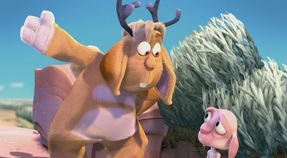
The Gist: A fleet-of-foot sheep loves to dance, and his hoof-tapping antics bring daily joy to his neighbors. One day, however, he gets snatched up, shaven, and dumped back in the wild, pink and wool-less. His admirers turn to mockers, laughing at his scrawny physique. Our hero despairs, until an upbeat, rhyming jackalope encourages him to cheer up. Slow at first, then with more confidence, the sheep begins dancing again, while his fellow creatures learn to overlook his missing wool.
What Hits: The message, while very direct, is strong and encouraging. Boudin' takes no extra interpretation or close dissection to understand the film's lesson—perfect for kids.
What Misses: Without much subtlety to it, Boundin' ends up a bit of a bore. In fairness, Pixar tried poetic narration here, something absent from all their other work. Nice try, but it just doesn't quite click. Stick to the non-verbal stuff.
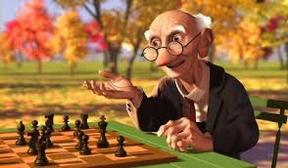
The Gist: A spindly old man plays chess in a park...against himself. Between moves, we see him saunter—back bent, breathing labored—to the opposite side of the table. After a slow start, the game picks up speed, as the geezer makes move after move amidst quick cuts. White plays a miserable game, losing every piece but his king. Knowing he's doomed to lose, the man fakes a heart attack, but spins the board around in the ensuing chaos. Now owner of the black pieces, the man chuckles, proudly planting the black queen on the back rank for the winning move.
What Hits: Like a house of mirrors, the short disorients delightfully with its layers of reflection. Isn't the man's final trick exactly what he's been doing the whole time anyway? The man even invents two different personas for himself on the fly: thoughtful and nervous vs. hasty and confident. An elderly gentleman rediscovering the imagination of his inner-child? Pure Pixar. It took Cars 117 minutes to do that.
What Misses: In the moment, the switcheroo charms, but it simply isn't as memorable as most of Pixar's other short film plots. We also spend over 20 seconds—eons for this format—celebrating the old man's victory, by far the least compelling segment of the piece.
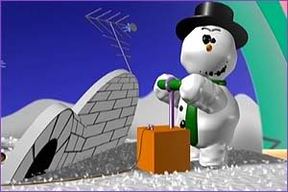
The Gist: A gloomy snowman stands in his snow globe, mere inches from a celebratory gathering of warm-weather toys and trinkets. Our wintery outcast attempts to break free from his glassy prison, employing (by turns) hammer, jackhammer, and TNT. No luck. Glaring, he inches the snow globe toward the edge of the bookshelf on which it sits, pushing just far enough to tip himself off. During free fall, our hero escapes through the bottom hatch of the globe, only to fall directly into a fish bowl on the floor. To his great fortune, a sultry mermaid sits on a rock nearby, lounging seductively. Alas, the snow globe floats down from above, once again trapping him inside.
What Hits: A workhorse short that does all the details well, Knick Knack merits a few repeat viewings to enjoy all its snowy bells and wintery whistles. The TNT scheme turned snowy flurry takes the film to another tier, and our hero's final disappointment provides the ending the short deserves.
What Misses: Stripped of Pixar polish, the short could be mistaken for an episode of Road Runner and Wile E. Coyote. It's all very clever: just not original.
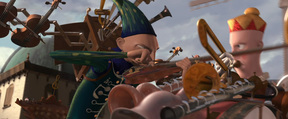
The Gist: A little girl ambles up to a fountain to toss in a coin. Sensing a business opportunity, a nearby street performer (think Bert from Marry Poppins) strikes up drum, cymbal and trumpet with John Philip Sousa gusto. Impressed, the little girl waddles over to give the man her coin. But then another sound! She spots a one-man-strings-section on the opposite side of the plaza, his talent even more impressive than the first. The two battle for her patronage to the point of exhaustion, at which point the girl, exasperated by the excessive showmanship, pulls out her own violin. After playing a quick, impossibly difficult ditty, she stares back in defiance, and tosses the coin in the fountain.
What Hits: Quietly, Pixar's always done music well (see Ratatouille and Incredibles, The), but this short features the medium like never before. The violinist street performer proves particularly engaging; credit to Pixar for creating such a satisfying complement to the standard tympani-cymbal-and-horn performer.
What Misses: The most mean-spirited of the shorts, the film's denouement goes beyond comedic disappointment (Knick Knack) to outright animus. Even the little girl comes off more resentful than clever. Granted, films don't always need likable characters: but this is family cinema, not Mad Men.
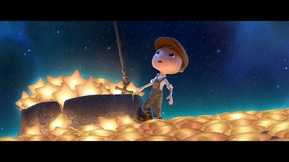
The Gist: A boy, his father and grandfather sit in a rowboat. Instead of casting a line down into sea, the trio erects a ladder skyward. Nudged along by his elders, the boy climbs the ladder, and just as he reaches the top, gets pulled from Earth and onto the surface of the moon. It turns out that golden, hubcap-sized stars lay strewn all over, and the three are responsible for sweeping them into piles. After a bit of old-vs-young banter and the arrival of an even larger star, Pixar zooms back out. The sweeping complete, we now see the familiar crescent shape instead of the original full moon sphere.
What Hits: Perhaps no Pixar short creates quite the same sense of wonder as La Luna. The short's mix of bizarre logic and boyish fascination came closer than any to matching my own childhood imagination.
What Misses: No studio does non-verbal film better than Pixar, but here, all the grunts and murmurs turn from a charming polish to a narrative crutch. Let the animation speak for itself. Additionally, the film's too cute conclusion disappoints after its magical opening.
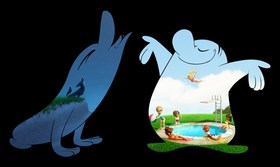
The Gist: A rooster crows in a sunny pasture, but we zoom out to find that the entire scene lives within the body of a dopey-but-amusing avatar, as he lies asleep against a black background. He wakes up, and as he walks along, we see rivers, clouds, and morning runners. He soon comes across a friend, whose body reveals the nighttime version of the same setting. We see a sunny pool party through one ("Day") and the same pool—moonlit, deserted—through the other ("Night"). At first, it seems Day has all the fun, but Night soon waddles his way toward Las Vegas, and its neon midnight lights prove much more fun than the sleepy daytime alternative. Each ill at ease by what they're missing, they come across a radio tower. The speaker declares that what is unknown is often what is most beautiful. Embracing their differences, the two do a little dance before the sun sets, Day becoming Night and Night becoming Day.
What Hits: The two visual layers—the foreground strolling, dancing, sleeping vs. the background action within the characters' bodies—compliment one another well, each busy enough without being distracting. Pixar's sense of timing, pace, and visual cues proves crucial, as they effortlessly pull our attention from foreground to background and back.
What Misses: The radio bit, while tasteful enough in implementation, struck me as a tad didactic. I kept picturing my kindergarten teacher: "The moral of the story is..." And as much as I complain about the throwaway gags in the closing seconds of these shorts, I ended up missing it here. While the day-becomes-night flip was fun, that too-perfect celebratory dance needs a last jolt of complication to keep the short interesting.
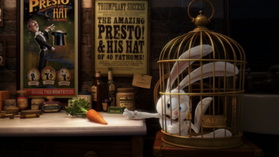
The Gist: A bunny stands locked in a cage, a nearby carrot just out-of-reach. Tummy still rumbling, a magician drags him onstage for his rabbit-out-of-a-hat routine. A series of gags ensue. The rabbit—clearly the smarter of the two—keeps getting the upper-hand, only to lose the carrot over and over through dumb luck and near misses. After having saved the entire act (and the magician himself from a nasty fall), the bunny begins sauntering off in disgust. All that for a lousy carrot he never got his teeth on. But here the magician waves his wand and rewards the bunny with the tasty prize. The short ends as the audience applauds.
What Hits: One of Pixar's better short film characters, the bunny's personality (smart but jaded) and expressions (indignant, snobbish), keep viewers' attention throughout all the gags. Like Monsters Inc., Presto's premise takes a familiar concept (monsters under the bed; magicians and bunny rabbits), and inverts our perspective (how do the monsters/rabbits feel?). Comedy.
What Misses: Another short taken from the Looney Toons storyboard playbook, Presto is much more fun than it is brilliant. Given its indulgent length and conventional themes, you wouldn't teach the short in a film studies class. You'd just watch it after class when you got home.
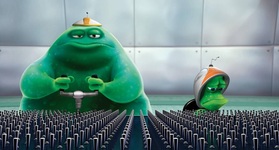
The Gist: A man lies sleeping in bed when a spotlight shines down on him. His body lifts into the air with an eerie stillness, floats toward the window, then bumps unceremoniously into the wall. We're whisked up toward the source of the light, whereupon we find a spaceship, the beam controlled by a young, nervous alien. A large examiner sits nearby, noting each of the youngster's moves on a clipboard. The young alien looks helpless, lost amongst the hundreds of identical looking switches in front of him. As he desperately tries to abduct the human properly, the situation only worsens. The Earth-dwelling man bounces all over his house, sails in and out the window, and slides back-and-forth through the leaves of his front-yard tree. The alien-in-training finally pulls the man up near the spaceship, then loses control, and the man free-falls back toward Earth. Fortunately, the spaceship's beam catches the man a foot from the ground (and certain death). We return to the spaceship to find that the instructor has leapt from his seat to hit the appropriate switch. He takes over, putting the man safely back in his bed. Seeing tears from the little alien's eyes, the instructor offers to let the little guy fly the whole ship. Overjoyed, the teenage alien grabs the controls, and promptly crashes the ship into the ground, leveling the house. As the ship flies off, we see that the man and bed alone remain undamaged. He's still fast asleep.
What Hits: Slyly, Lifted raises a question--What's more frightening: getting abducted or taking your driving exam?--and by the short's end, the answer is both clear and not what you'd expect. The playful juxtaposition of fantastical (aliens) and mundane (bored, clipboard-wielding instructor) also contrasts the two worlds amusingly.
What Misses: Pleased with its own cleverness, the short ends up focusing more on comedic touches than developing its compelling narrative. You'll love Lifted for the laughs, not for the message.
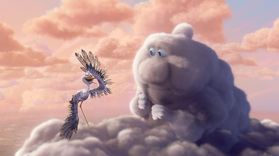
The Gist: Storks fly down from the clouds to deliver babies of all species, an adorable pup here, a crying human there. We follow one stork as he returns home, and quickly discover that all storks have their own magical, baby-making cloud. But our stork is a little different than others. His feathers more scarce, his cloud a bit grayer, he must carry all the most dangerous babies, from sharks to porcupines to rams. After a particularly harrowing delivery, our stork gazes longingly at a nearby cloud, who's just created a litter of adorable puppies. He flies toward the whiter, kinder cloud, while his gray cloud sulks, then cries, creating a storm below. But then there he is! The stork returns! He's only left to collect pads and helmet for his next delivery. The cloud and stork share a touching embrace, before the cloud creates...an electrical eel. So much for the pads.
What Hits: Perhaps the most touching of all the Pixar shorts, Partly Cloudy's celebration of loyalty tends to moisten eyes and wet handkerchiefs. I also love the motivation question: Where do storks go AFTER they deliver the baby? Genius.
What Misses: My only complaint with Partly Cloudy is its length. Personally, I love all six minutes, but the short film critic in me thinks this could have been a tight, four-minute masterpiece.
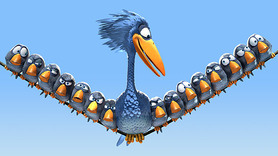
The Gist: A congregation of blue birds sit on a telephone wire. Nasty and selfish by nature, they jostle with one another for space. Their bickering grows, but the sound of a much larger, clownish avian interrupts them. The blue birds seize on the newcomer's deep honking voice and frazzled plumage, mocking his appearance and ridiculing his voice. Unfazed, the happy-go-lucky guest squeezes his way to the center of the group, but slips, hanging only by a few talons. Sensing an opportunity, the birds on each immediate side begin pecking away at his toes, hoping to loose him from the wire. As more join in, the wire sags all the more. Just before the last toe goes, a few blue birds discover the folly of the plan, but it's too late. We see the clownish bird fall a few short feet to the ground, while the rest launch upward, their feathers (having fallen off) floating slowly down. After a few moments, the blue birds—now pink and featherless—land next to the outsider. As he honks and laughs, more and more featherless avians land.
What Hits: More than any other Pixar short, For The Birds displays sterling storytelling economy. We only need one angle (and just two or three zoom levels) to watch the whole film unfold. The tension builds splendidly (and literally, as the wire sags), and the final minute is surprisingly suspenseful for a three minute film.
What Misses: The message—bullying has its consequences—is memorably executed, but not nearly as touching as, say, Partly Cloudy's.


 RSS Feed
RSS Feed
